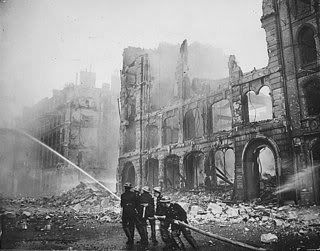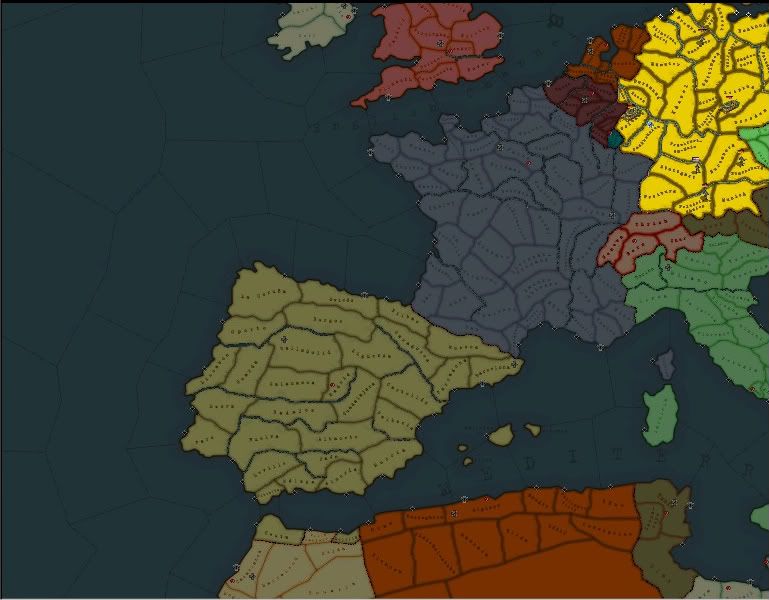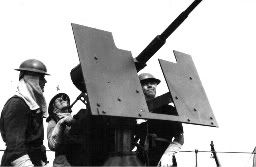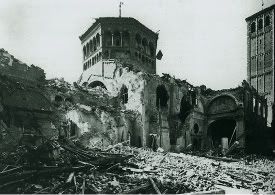I find it weird that Chezckia and Slovakia are not united, Because the soviets wanted a unified "Central European Republic" in OTL aswell.
The Eyes of the World Are Upon Us - A US AAR
- Thread starter Sectorknight21
- Start date
-
We have updated our Community Code of Conduct. Please read through the new rules for the forum that are an integral part of Paradox Interactive’s User Agreement.
You are using an out of date browser. It may not display this or other websites correctly.
You should upgrade or use an alternative browser.
You should upgrade or use an alternative browser.
Interesting, Germany is bound to be divided and then re-united it seems.
As usual
Interesting plot, there was a schizm in Syndicalist bloc it seems. Eastern Europe is then Totalist, and Western Europe is Syndicalist/Radical Socialist? Is Luxemburg tiny Peoples Republic? I would expect that Commune of France would anex Luxemburg and Wallonia, giving Flanders to Socialist Republic of Dietsland.
Yes,
The French already have to deal with internal troubles and unrest in Alsace-Lorraine, so annexing other nations was out of the question.
Anyway, great setup you have made, so I eagerly wait for new update.
I never trusted that fellow Steiner...
Well, I was tempted to make the Kennedys a PSA clan, due to Joe Kennedy's bussiness in Hollywood in the 20s. But I decided for the USA due to Joe's support to FDR in the 32's convention and his relation with FDR which ensued.
In the end, everything depends on the author.
Indeed, besides who else could I have take over in the 60s, Nixon?
Hm, surprisingly you have borders similar to OTL. Also, it kinda looks funny to se Austria not in the Warsaw Pact, but that is just me.
Austria, after an amount of time underwent a revolution and is as of right now like Switzerland, isolationist to the end.
More updates plesae
Soon, friend soon.
How odd to see Bukharin and the Soviets taking the moral high ground over the Internationale. I don't buy for a second that he actually cared about what happened to the Germans, but thanks to him things have certainly worked out well for the Soviets.
Of course, Bukharin is an egocentric maniac that believes that this will make him look good amongst the nations he holds under his sphere.
I find it weird that Chezckia and Slovakia are not united, Because the soviets wanted a unified "Central European Republic" in OTL aswell.
Well, I did want a Czechoslovakia, but as Bohemia was conquered by the reborn Austro-Hungarian empire nationalism seethed for those 6 years, and the Soviets decided to leave well enough alone.
Anyway, sorry for the delay, I plan on having an update by later tonight and at latest tomorrow.
P.S I've decided to start a new AAR, maybe soon as I have some free time coming up since I have gathered most of my volunteer hours. I've noticed Germany needs some loving, I'll be sure to add on of my special twists to the story.
Anyway, sorry for the delay, I plan on having an update by later tonight and at latest tomorrow.
Nope
Nope
Oh, I didn't see that part. I am glad you'll continue it then. I wonder if the US is Social Conservative; it would bring more flavor than just being Market Liberal (at least in my opinion).
Western Europe
Union of Britain

Children hoping to find their parents in the ruins of London

Firemen attempt to put out a flaming building in Glasgow, headquarters of the ULP
Spain

Union of Britain
Western Europe, home of many a tragedy post 1950. In 1949, the disgraced member of the Maximist Party, Eric Blair (now living in New York City after his escape from Britain) wrote “1984”. Within days the book was a best seller in the US, Canada and the rest of the nations of the Entente, and within hours the book was banned in the nations of the Internationale and of the Moscow Pact, for “spreading counter-revolutionary ideas”. But what most of the politicians didn't understand was that Mr. Blair had played them for fools, you see by now, things were heating up between the Internationale and the MP as they began to play each other off as “revisionists” and by both agreeing to one thing (in this case, the banning of the book) it showed that both alliances were little different than the other.
In any case, “1984” sets a man named Winston in the backdrop of a dystopic London, capital of Airstrip One of Oceania. Eric Blair made chilling predictions of the future, although very vague, there are mentions of a Civil War in Britain between the Maximists (at which that time, dominated the political landscape of Britain, with Oswald Mosley at the head) who wished to keep themselves in power through dictatorial powers, and the rest of the political parties, as they attempted to keep themselves alive. It was never made clear who won, all that was said was that whomever did win lost all previous sentiment of goodwill and democracy, and perverted Britain into a totalitarian dystopia. Blair was named the “Man who foresaw the future” of course he was very wrong about the outcome.
In 1949, after the continuation of the very much hated “Ration Acts” which rationed food for families by the grams according to size, still three years after the Second World War was won. The people were getting anxious as well was the leadership of Britain. No one really believed that Oswald Mosley won his election as General Secretary of the TUC fairly, but in the rush of the out break of World War 2 people had little care for such news, as Britain was gearing up to aid France. It should come to no surprise why Mosley was so anxious, the ousting of the French General Secretary Valois (when I say ousting I mean a holding of a Trade Unions vote, at the “behest” of the military and the general population, where he was politically “slaughtered” and thrown out of office). Mosley realized his only hope was Russia, he had already lost the sympathy of the new French government and by extension the rest of the Internationale. The once, cool and calm man whom had led his people through the bombing of London and the Battle of Britain realized that the only thing he could do was secure his position by any means necessary. In 1950, Mosley and his Maximist allies pushed through the “Civil Defense Act of 1950” which banned public protests, limited freedom of speech and of association. If civil unrest was before, it was terrible now, riots were frequent, and the Maximists were becoming more and more paranoid. It didn't help when the remaining parties (Federationists, Congregationalists , and the Authonomists) united to form the United Labour Party. In the end, no one wins if everyone's losing, in other words, Mosley gave the order to shoot rioters on sight, and the British Civil War began. The short conflict lasted only a year and a half, however the end result is very bloody, as over a million people were killed in just 7 1/2 months. The United Labor, would win the day after Mosley was executed at his home estate. After the war was over, countries all over the world sent aid, even the United States, which allowed the warming of relations between the UoB and the US from then on.
In recent time, Britain has been slowly separating themselves from the Internationale, ever since the United Labor Party has opened up other leftist partied for TUC candidacies, overall Britain is much better off today than it was 50 years ago in social liberties, however, there is still a deep scar across the Union
In any case, “1984” sets a man named Winston in the backdrop of a dystopic London, capital of Airstrip One of Oceania. Eric Blair made chilling predictions of the future, although very vague, there are mentions of a Civil War in Britain between the Maximists (at which that time, dominated the political landscape of Britain, with Oswald Mosley at the head) who wished to keep themselves in power through dictatorial powers, and the rest of the political parties, as they attempted to keep themselves alive. It was never made clear who won, all that was said was that whomever did win lost all previous sentiment of goodwill and democracy, and perverted Britain into a totalitarian dystopia. Blair was named the “Man who foresaw the future” of course he was very wrong about the outcome.
In 1949, after the continuation of the very much hated “Ration Acts” which rationed food for families by the grams according to size, still three years after the Second World War was won. The people were getting anxious as well was the leadership of Britain. No one really believed that Oswald Mosley won his election as General Secretary of the TUC fairly, but in the rush of the out break of World War 2 people had little care for such news, as Britain was gearing up to aid France. It should come to no surprise why Mosley was so anxious, the ousting of the French General Secretary Valois (when I say ousting I mean a holding of a Trade Unions vote, at the “behest” of the military and the general population, where he was politically “slaughtered” and thrown out of office). Mosley realized his only hope was Russia, he had already lost the sympathy of the new French government and by extension the rest of the Internationale. The once, cool and calm man whom had led his people through the bombing of London and the Battle of Britain realized that the only thing he could do was secure his position by any means necessary. In 1950, Mosley and his Maximist allies pushed through the “Civil Defense Act of 1950” which banned public protests, limited freedom of speech and of association. If civil unrest was before, it was terrible now, riots were frequent, and the Maximists were becoming more and more paranoid. It didn't help when the remaining parties (Federationists, Congregationalists , and the Authonomists) united to form the United Labour Party. In the end, no one wins if everyone's losing, in other words, Mosley gave the order to shoot rioters on sight, and the British Civil War began. The short conflict lasted only a year and a half, however the end result is very bloody, as over a million people were killed in just 7 1/2 months. The United Labor, would win the day after Mosley was executed at his home estate. After the war was over, countries all over the world sent aid, even the United States, which allowed the warming of relations between the UoB and the US from then on.
In recent time, Britain has been slowly separating themselves from the Internationale, ever since the United Labor Party has opened up other leftist partied for TUC candidacies, overall Britain is much better off today than it was 50 years ago in social liberties, however, there is still a deep scar across the Union

Children hoping to find their parents in the ruins of London

Firemen attempt to put out a flaming building in Glasgow, headquarters of the ULP
Spain
Spain (offically known as La Federacion Unida de Espana, or the United Federation of Spain) after the syndicalist victory in the SCW (in no small part due to French intervention), Spain has been a nation of tradgedies. During the Second World War, Spain lost over 6% of its male population in the fields of France and Germany, it suffered massive famines as most Spanish ports were blockaded by Entente ships after their victory in the Battle of the Atlantic and suffered major shelling of cities by American battleships and cruisers. The only thing that kept Spain from falling into anarchy and disarray, was the peace between the Internationale and the Entente after the atomic bombings of Japan, many were starving in the streets, food riots were a regular sight since any French aid stopped as troops on the front were a much higher priority. Fortunately, as Spanish industry went from producing rifles to producing more consumer goods, things got better, people found work and over the situation mellowed out. If only it wasn't for March 23rd 1964, if a day were to ever go down in infamy for the Spanish it should be that one. At 3:30 AM, the Portuguese Air force, running several exercises as it had always had since the Syndicalist victory in the SCW along the Spanish-Portuguese border, when a plane suddenly crossed into Spanish territory. It took only moments for the Euro Defense Network to pick it up (courtesy of a radar satellite array in north-western Spain) and shoot the plane down. The Portuguese government demanded compensation, it had only been a relatively small incident in the long list of tensions between both nations. Unfortunately, the Spanish government incorrectly called the Portuguese bluff and denied compensation, Portugal declared war only months later. It was a relatively bloody affair, much bloodier than it should have been. The Spanish Army simply wasn't well trained enough to fight the Portuguese effectively, and while the Spanish did make advances they did so at the expense of heavy casualties. It wasn't until the French blockade of Portuguese ports (the UoB refused to send the RN or even participate in the war, still guarding hurt feelings over the little intervention in the British Civil War) that the Spanish were truly able to take Lisbon. In the end Portugal was annexed into the Spanish nation, now very much looking like Britain in its varying number of nationalities.

A Spanish Anti Air Battery Holds Off American Bombers

Portuguese outpost destroyed by Spanish shelling.
In the modern day, Spain is the powder keg of Western Europe, its the point of dissociation of the Internationale as Britain and Italy still refute the fact that the annexation of Portugal was legal. Also, nationalism is on the rise, as the US backed Portuguese Liberation Front is slowly gaining traction in former Portugal and Basque and Catalan independence sentiments are on the rise.

A Spanish Anti Air Battery Holds Off American Bombers

Portuguese outpost destroyed by Spanish shelling.
In the modern day, Spain is the powder keg of Western Europe, its the point of dissociation of the Internationale as Britain and Italy still refute the fact that the annexation of Portugal was legal. Also, nationalism is on the rise, as the US backed Portuguese Liberation Front is slowly gaining traction in former Portugal and Basque and Catalan independence sentiments are on the rise.

The reason France and Italy are not mentioned is because they have had a relatively calm time, not much to note.
Also, don't mind Africa, there will be some changes. Just that I doubt you expect them.
Also, don't mind Africa, there will be some changes. Just that I doubt you expect them.
I wouldnt want to critize but, Shouldnt it be Union of Iberia? After all the FAI in CNT-FAI stands for Federation Anarqista IBERICA.
I wouldnt want to critize but, Shouldnt it be Union of Iberia? After all the FAI in CNT-FAI stands for Federation Anarqista IBERICA.
Not necessarily, I'll explain more when I go over individual alliances, but for now I'll say that the Spanish are much more centralized, and more pro-Spanish. (not as much as the Totalists are though). And that would be why they are so many secessionist problems. We'll blame the French, since they imposed many of the constitutional points.
And don't worry about criticizing, any author is happy with constructive criticism.
I see the Internationale got the shorter end of the stick than the Soviet Union. I am glad Spain managed to recover.
Poor Britain and Spain. Oh btw do you think that Madrid should still have the control of Ceuta and Mellila ?
Okay, Lets all blame the french!
Wait till Kurt gets in here!
Ah, returning to the old traditions of ancient times...
Poor Britain and Spain. Oh btw do you think that Madrid should still have the control of Ceuta and Mellila ?
Well, if they are named Autonomous Commune of Ceuta and Autonomous Commune of Mellila, I don't see any problem.
Britain at least seems like a fairly nice place today, I'm not very optimistic about its future though. The Portugese government must have been suicidal, how could they have thought they would win against a Spain backed by France?

